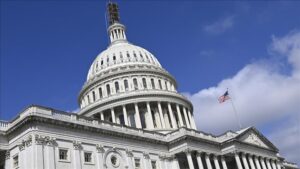Senate Voted to End Trump’s Global Tariffs, Highlighting Deep Economic and Political Divides

In a rare bipartisan move, the US Senate voted Thursday to repeal former President Donald Trump’s sweeping global tariffs, a measure that exposed both economic anxieties and political fractures within the Republican Party.
Four GOP senators: Rand Paul (Ky.), Mitch McConnell (Ky.), Susan Collins (Maine) and Lisa Murkowski (Alaska), joined Democrats in passing the resolution, which seeks to terminate Trump’s national emergency declaration that authorized broad tariffs on imports from allies including the European Union, Japan, and South Korea.
Though largely symbolic, the vote marks a significant rebuke of Trump’s trade strategy, which has reshaped global markets and strained long-standing alliances. The House, controlled by Speaker Mike Johnson (R-La.), is unlikely to consider the resolution, and Trump has vowed to veto any limits on his executive trade powers.
Still, the Senate action carries weight beyond its legislative fate. It exposes a growing discomfort among both parties over the long-term costs of tariff-based trade wars, not only for businesses but also for ordinary Americans. In his words, Sen. Ron Wyden (D-Ore.), the resolution’s Democratic sponsor said – “American families are being squeezed by prices going up and up and up. More than three-quarters of families say their monthly expenses have increased by more than $100 a month.”

Sen. McConnell, in a rare public split from Trump, echoed those concerns earlier this week. “Tariffs make both building and buying in America more expensive,” he said, warning that history shows trade wars hurt workers, not help them.
To many US manufacturers and small businesses, Trump’s tariffs have been a double-edged sword, offering protection from foreign competition while driving up costs for imported materials like steel, aluminum, and electronics. Economists say the ripple effects have extended from factory floors to grocery stores, deepening inflationary pressures and unsettling global supply chains.
The political implications are equally complex. The vote highlights the lingering fault lines within the Republican Party between traditional free-trade conservatives and Trump’s nationalist wing. For Democrats, it provides an opportunity to position themselves as defenders of consumer interests ahead of an election season defined by economic anxiety.
Culturally, the tariffs debate taps into broader questions about America’s identity in a globalized world. Whether the country sees itself as a cooperative trading partner or a fortress economy. The Senate’s move may not change immediate policy, but it signals a rare moment of bipartisan acknowledgment that the costs of isolationism are being felt at kitchen tables and in boardrooms alike.








